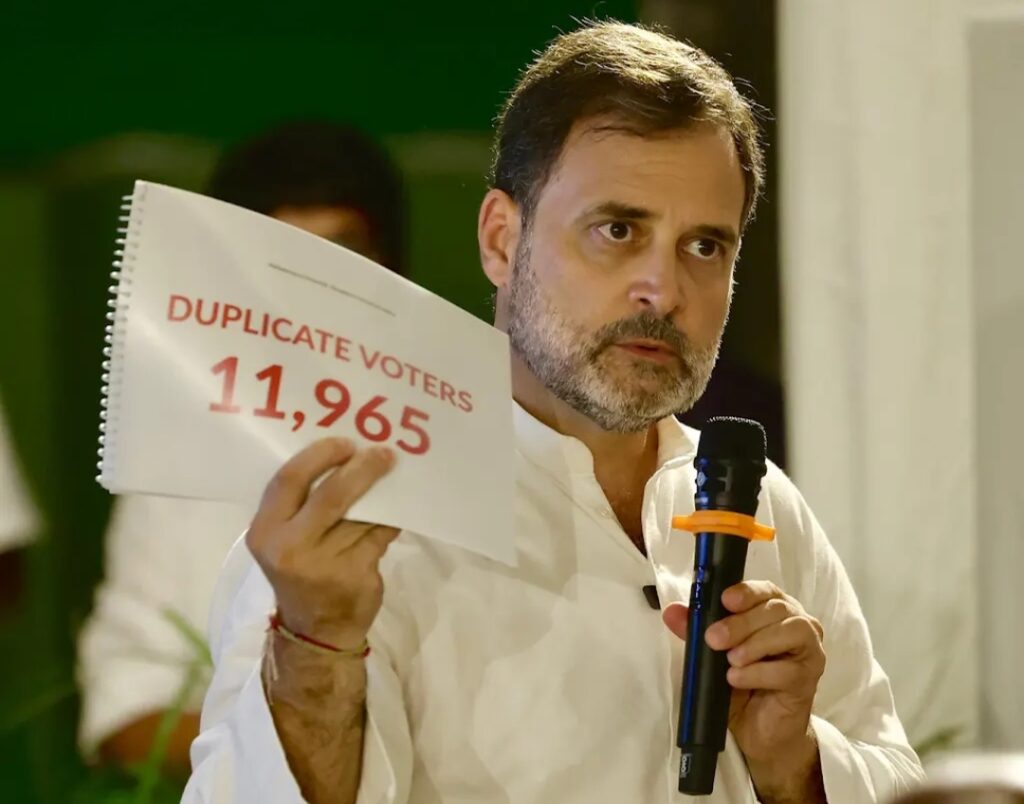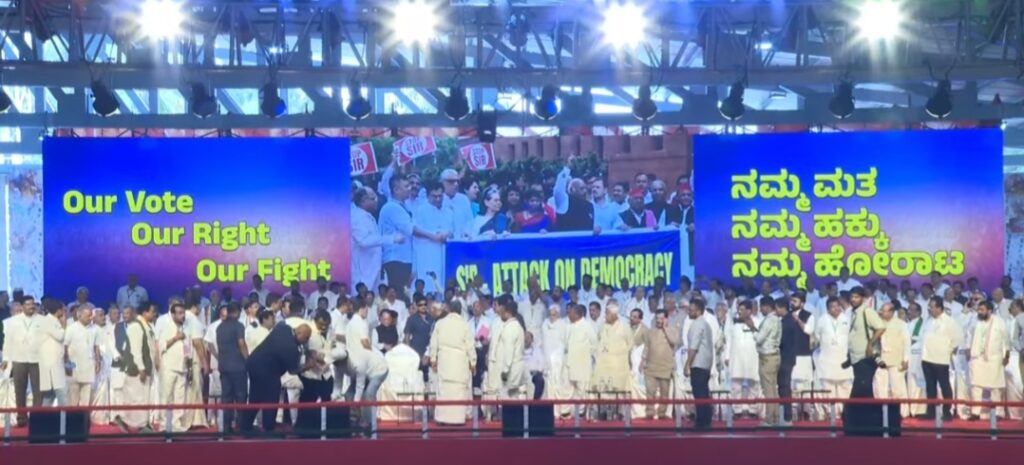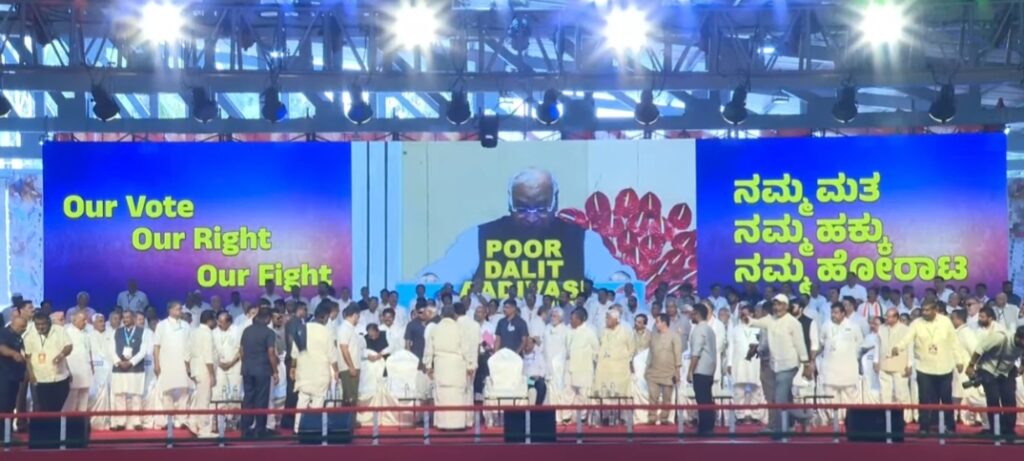


“Vote Chori” and the Vanishing Guardian: The Election Commission of India on Trial
Rahul Gandhi’s explosive exposé on electoral fraud in Mahadevapura is more than a local scandal—it is an indictment of the Election Commission’s collapse under political pressure, and a wake-up call for Indian democracy.
On the evening of August 7, 2025, in what may be remembered as a turning point in India’s post-independence democratic history, Leader of the Opposition Rahul Gandhi walked into a press conference armed not with slogans but with slides. Titled “Democracy Destroyed,” the presentation laid bare the systemic manipulation of voter rolls in Mahadevapura—an assembly segment in Bangalore—during the 2024 Lok Sabha elections. The evidence was not speculative or anecdotal. It was compiled from official records obtained from none other than the Election Commission of India (ECI) itself.
The findings were chilling: 1,00,250 fraudulent voter entries identified in just one assembly segment, spanning five distinct categories of manipulation. Each number told a story of institutional decay:
• 11,965 duplicate voters
• 40,009 fake or invalid addresses
• 10,452 voters registered under the same address
• 4,132 entries with invalid photos
• 33,692 cases of Form 6 misuse (used to add names to the electoral roll)
These are not minor clerical errors or isolated administrative lapses. These are acts of what can only be described as electoral sabotage—and they implicate not just political players, but the very institution tasked with protecting the sanctity of Indian democracy: the Election Commission of India.
The Disappearing Neutral Arbiter
The Election Commission, once regarded as one of India’s most trusted constitutional bodies, has over the last decade seen a dramatic erosion of public trust. This is no coincidence. A growing body of evidence—of which the Mahadevapura case is only the latest—suggests that the ECI has increasingly acted as an enabler rather than a watchdog.
Rahul Gandhi’s data-backed exposé tears away the fig leaf of institutional neutrality. That the Congress party could unearth these manipulations using ECI data proves one thing: the Commission was fully aware of the rot, but chose not to act. In other words, it had the means, the tools, and the constitutional mandate to halt vote fraud—but it stood by, either complicit or criminally negligent.
The question is: Why didn’t it act?
Mahadevapura Is Not An Anomaly
If 1,00,250 irregular entries can be found in a single assembly segment, what might a forensic audit across all 543 parliamentary constituencies reveal?
This is not an alarmist hypothetical. A 2012 Times of India investigation found 547 voters registered at one address in Noida’s Sector 53. In Bihar, recent updates to the electoral roll led to 6.1 million voters being purged—without adequate public explanation or due process. Across the country, similar reports abound: thousands of names deleted, relocated, duplicated or inserted—often in constituencies where margins of victory are razor-thin.
Mahadevapura, then, is a microcosm. It is not an exception. It is the rule.
‘’Vote Chori’’: A New Lexicon for a New Crisis
“Vote Chori” — the phrase coined and popularised during Gandhi’s presentation — isn’t just rhetorical flourish. It captures a reality that is both criminal and systemic. Unlike mere booth capturing (which can at least be physically countered), this is an invisible form of disenfranchisement. It takes place behind computer screens, during “voter list revisions”, and through bureaucratic manoeuvres impossible for the average citizen to trace or contest.
What makes this theft especially sinister is that it is hardwired into the system. Form 6, intended for genuine additions to voter lists, is routinely weaponised. Mass entries are made using ghost addresses, sometimes entire buildings housing hundreds of voters that don’t even exist.
And once the list is polluted, democratic outcomes are pre-determined, elections become formalities, and citizens are reduced to spectators in what is meant to be their own republic.
The EC’s Belligerent Silence
Instead of welcoming scrutiny, the Election Commission has chosen hubris. Rather than call for an immediate investigation, the ECI’s official response to mounting public concern has been one of defensiveness and disdain. It resorts to tweets, not testimonies. It lectures citizens on “misinformation”, rather than confronting the disinformation built into its own rolls.
Even more galling is its reluctance to release voter records publicly. In an era where digitised data can be transparently shared with minimal cost, the ECI hides behind bureaucratic fog. What does it fear? If it has nothing to hide, why not open the books?
India’s Most Dangerous Electoral Cycle
To understand the gravity of what transpired in Mahadevapura, one must revisit the context of the 2024 elections. Unlike 2014, which witnessed a genuine Modi wave, and even 2019, which retained pockets of urban enthusiasm, the 2024 election was widely marked by voter fatigue, economic discontent, and widespread disillusionment with the ruling regime.
And yet, the BJP registered another landslide victory.
There was no wave. But there was a win.
The answer, it now appears, lies partly in the electoral rolls. If 1 lakh fake votes can be manufactured in a single assembly segment, it doesn’t require a nationwide conspiracy to swing results. A few dozen such operations—coordinated, funded, and overlooked by the ECI—could tilt power in dozens of seats.
Democracy does not always die with a bang. Sometimes it dies with a form—Form 6.
A Compromised Chain of Accountability
It is not just the Election Commission that stands accused. The media, which once scrutinised every irregularity, has become a cheerleader for the ruling dispensation. The courts, too, have remained eerily quiet—despite the fact that the Supreme Court has long held that free and fair elections are part of the Basic Structure of the Constitution.
What happens when the guardians of that basic structure themselves go missing?
In most democratic systems, revelations like those made by Rahul Gandhi would trigger a parliamentary inquiry, judicial commission, or electoral reform process. In India today, they barely cause a ripple on the evening news.
That silence is the loudest proof of institutional failure.
Solutions Exist. But Is There Will?
AI-generated recommendations for countering electoral fraud—citizen audits, parallel vote counts, hyper-local media watchdogs—are heartening. But even the best technological solutions flounder in the face of political capture.
To fight this level of entrenched manipulation requires not just data, but mobilisation. The INDIA alliance may have the momentum, but does it have the ground force, the legal strategy, and the media reach to sustain this fight? Can it push the ECI into the dock, and not just into damage control?
The Way Forward: Reclaiming the Republic
The time for cautious diplomacy with institutions has passed. If the ECI refuses to be transparent, it must be forced to. Through citizen petitions, international pressure, and continuous public agitation, the fight for voter rights must become central to the democratic project.
Rahul Gandhi’s press conference may be remembered as the spark. But for it to become a fire, civil society, opposition parties, and every disenfranchised voter must stoke it.
The founding fathers of the Indian Constitution created the Election Commission as a bulwark against tyranny. What we are witnessing today is the betrayal of that trust. If the ECI cannot clean its own house, it has no business overseeing the country’s.
The Election Commission Must Come Clean
The revelations from Mahadevapura have exposed more than a local scandal. They have revealed a nationwide infrastructure of fraud, operating under the guise of democracy and sanctioned by the silence of institutions. The Election Commission of India, once a pillar of constitutional integrity, now stands in ruins.
It must be rebuilt—or replaced.
If this is not the moment for outrage, then India may never find one.
Let us call this what it is: vote chori, democracy theft, electoral fraud of historic proportions. And let us respond accordingly—not with despair, but with resistance.
Because a nation that cannot defend its vote, cannot call itself free.
Hasnain Naqvi is a former member of the history faculty at St. Xavier’s College, Mumbai





